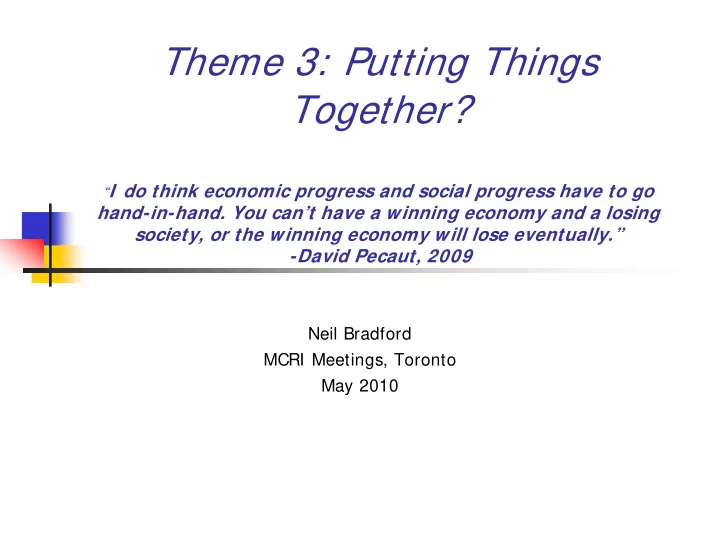

Theme 3: Putting Things Together? “ I do think economic progress and social progress have to go hand-in-hand. You can’t have a winning economy and a losing society, or the winning economy will lose eventually.” -David Pecaut, 2009 Neil Bradford MCRI Meetings, Toronto May 2010
Presentation Overview Part 1: Setting the Scene: The ‘Local Turn’ Part 2: Interpreting Governance and Strategy: A Capital(s) Framework Part 3: Variations on a Theme: Different “Tents”
Part 1. Setting the Scene: The ‘Local Turn’ A by now familiar narrative about “globalization” that informs the MCRI Going Local : place and context matter; policy implementation � gaps; learning for innovation Associational : multi-sectoral, inter-municipal � representation/ engagement of city-region players (eg. business, community, education, talent) Multi-level : targeted, tailored, and aligned upper level � interventions to leverage unique configuration of local assets Our Theme 3 explores how these three social dynamics play out institutionally at the city-region scale to shape development strategies/ trajectories
The ‘Local Turn’ … We observe locally institutionalized networks supplying economic governance – “strategic management of local development” I nteresting questions arise: How inclusive of local interests? � How embedded in decision making routines? � How influential in driving development? � An ideal type often projected: the “big tent” that includes economic, cultural, social, (ecological) in strategic planning process (eg. Wolfe 2009) But the form, nature, purpose, even existence of the tent is an empirical question Appropriately, our Theme 3 research explores governance and strategy through city-by-city analysis of organizational relations, institutional arenas, leadership styles, galvanizing issues
Part 2. Interpreting Governance and Strategy: A Capital(s) Framework Theme 3 Meta-question: How to interpret the patterns of collaboration/competition in city- region governance and strategy? Two helpful concepts: social capital (Putnam, 1993) and civic capital (Wolfe and Nelles, 2008) Bring the two capitals together for analysis of local state-society relations and economic governance/development strategy
Social Capital … Historically-evolved trust relations that enable cooperation Three distinct forms: Bonding: (within sector) � Bridging: (between sectors) � Linking: (across levels) � Social capital helps us understand certain institutionalized partnerships, Yet for our purposes the concept has limitations: static rather than dynamic, not centrally directed at public governance and policy processes, and not scaled to city- region
Civic Capital … Organizational relationships that emerge from interpersonal networks tied to a specific locality, contributes to shared development vision and common policy goals For our purposes, a dynamic concept, attuned to city- region scale, directed to strategic economic governance Flows of civic capital can leverage stocks of social capital: Civic entrepreneurs forge development coalitions through dialogue and experimentation in governance settings
Part 3. Variations on a Theme: Different Tents Across our city-regions unique configurations of social and civic capital find expression in governance and strategy Three ideal types to order our case findings: I nstitutional Collaboration : “Big Tent” with inclusive 1. governance, holistic development I nstrumental Partnerships : “Tent City” with various 2. issue-specific join-ups, balanced development I ndependent Sectors : “Tent-ative” with sectors 3. pursuing own priorities, contested development
Comparative Matrix: Theme 3 Institutional Logics I nstitutional Collaboration I nstrumental I ndependent Sectors Partnerships Where collaborative body cooperative projects competitive visions What holistic development balanced development contested development Who multi-sectoral and open to partnerships but mostly economic, social, new voices ‘usual suspects’ cultural in respective silos How boundary crossing dialogue interest-based zero-sum debate negotiation Why Bridging social capital/civic Bonding social Bonding social entrepreneurship capital/civic cooperation capital/civic competition Literature exemplars Henton et al. (1997) Cohen and Fields (2002) Saxenian (Route 128) OECD (2007) Safford 2008 (Allentown) Safford 20008 (Youngstown) Selected city-region Montreal (CMM, CEDC) Vancouve r (VEDC/DTES London (LEDC v. Smart examples? UDA) Growth Network) Waterloo (Prosperity Council) Ottawa ( OCRI/LASI) Kingston (KEDCO v. inclusive city advocates) Calgary (TBL planning) Halifax (GHP/Seaport)
Five Takeaways: Learning, Hybrids, Contingency, Diversity, Size Learning : a soft path dependency, with trajectories open to 1. change either through “incremental layering” or “crisis rupturing” Hybrids : governance and strategy can mix forms and 2. projects in ‘less than ideal types’ Contingency : social learning processes are not linear; city 3. regions may jump governance ‘stages’ or revert to earlier forms Diversity : Theme 2 cultural issues often the mobilizing 4. common ground for economic and social coalitions Size doesn’t determine : different “tents” appear across 5. large, medium, small cases; social and civic capital not size- dependent
Recommend
More recommend